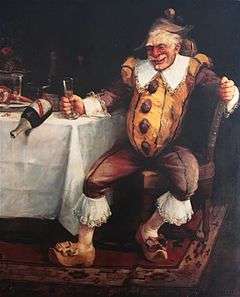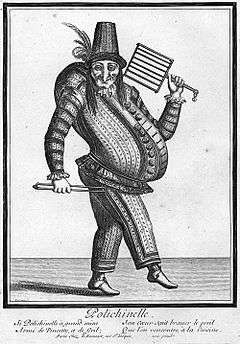Pulcinella



Pulcinella (Italian pronunciation: [pultʃiˈnɛlla]), often called Punch or Punchinello in English, Pulecenella in Neapolitan, Polichinelle in French, is a classical character that originated in the commedia dell'arte of the 17th century and became a stock character in Neapolitan puppetry.
Name
A plausible theory derives his name from the diminutive of Italian pulcino (chick), on account of his long beaklike nose, as theorized by music historian Francesco Saverio Quadrio, or due to the squeaky nasal voice and "timorous impotence" in its demeanor, according to Giuseppe (Joseph) Baretti.[1]
According to another version, Pulcinella derived from the name of Puccio d'Aniello, a peasant of Acerra, who was portrayed in a famous picture attributed to Annibale Carracci, and indeed characterized by a long nose.[1] It has also been suggested that the figure is a caricature of a sufferer of acromegaly.[2]
Characteristics
Always dressed in white with a black mask (hence conciliating the opposites of life and death), he stands out thanks to his peculiar voice, whose sharp and vibrant qualities produced with a tool called a swazzle contribute to the intense tempo of the show. Pulcinella often carries around macaroni and a wooden spoon. According to Pierre-Louis Duchartre, his traditional temperament is to be mean, vicious, and crafty and his main mode of defense is to pretend to be too stupid to know what's going on. In more modern times, Pulcinella is lazy and sly. He is extremely animated and overexaggerates his movements, which helps emphasize the ridiculousness of his character. People know that he is spontaneous, and thus very untrustworthy. He changes his character according to his mood, often pretending to be homeless, rich, or a theif. Pulcinella will always take advantage of a situation, regardless of the person or consequences. He is so well known "that his name is often used to describe real people bearing the same traits..."[3] In some versions Pulcinella has a brother Cucurucu.[4]
Variants
The look of the mask has changed very little over the centuries. Many regional variants of Pulcinella were developed as the character diffused across Europe. In Germany, Pulcinella came to be known as Kasper. In the Netherlands he is known as Jan Klaassen. In Denmark he is Mester Jakel. Russian composer Igor Stravinsky composed two different ballets entitled Pulcinella and Petrushka, inspired by him. In Romania, he is Vasilache; in Hungary he is Vitéz László, and in France Polichinelle, while in the United Kingdom he inspired the character of Mister Punch of Punch and Judy.
Miscellanea
- Pulcinella Awards mascot – Pulcinella is also the mascot of the Pulcinella Awards, annual awards for excellence in animation, presented at the Cartoons on the Bay Festival in Positano, Italy.
- Open secret – In various European languages, including at least Italian,[5] French,[6] Spanish,[7] Polish,[8] and Portuguese [9] a "Pulcinella's secret" or a "Polichinelo's secret" is an open secret.
See also
References
- 1 2
 Wheeler, R. Mortimer (1911). "Punch (puppet)". In Chisholm, Hugh. Encyclopædia Britannica. 22 (11th ed.). Cambridge University Press. pp. 648–649.
Wheeler, R. Mortimer (1911). "Punch (puppet)". In Chisholm, Hugh. Encyclopædia Britannica. 22 (11th ed.). Cambridge University Press. pp. 648–649. - ↑ "UK | England | Derbyshire | Mr Punch's 'bad mood' syndrome". BBC News. 2006-09-05. Retrieved 2010-05-25.
- ↑ DeFilippo, Anna. "Pulcinella." Pulcinella | Italy. N.p., 27 Jan. 2016. http://www.lifeinitaly.com/heritage/pulcinella
- ↑ Pierre Louis Duchartre -The Italian Comedy 2012 – Page 220 "But, strangely enough, the new version looked remarkably like one of Pulcinella's earliest costumes, or, if not his, at any rate that of his brother Cucurucu. For it may be pointed out that Cucurucu was an onomatopoeic name derived from the derived from the crow of a cock, and since Pulcinella's name was derived in precisely the same fashion, the relation between the two characters is very close...."
- ↑ "pulcinella translation from Collins Unabridged Italian-English dictionary". www.collinsdictionary.com. Retrieved 2012-10-30.
- ↑ "polichinelle translation from Collins French-English dictionary". www.collinsdictionary.com. Retrieved 2012-10-30.
- ↑ "secreto de Polichinela translation from Collins Unabridged Spanish-English dictionary". www.collinsdictionary.com. Retrieved 2012-10-30.
- ↑ "poliszynel, Słownik Wyrazów Obcych i zwrotów obcojęzycznych Władysława Kopalinskiego". www.slownik-online.pl. Retrieved 2015-09-01.
- ↑ "Polichinelo". www.ciberduvidas.com. Retrieved 2015-03-20.
External links
| Wikimedia Commons has media related to Pulcinella. |